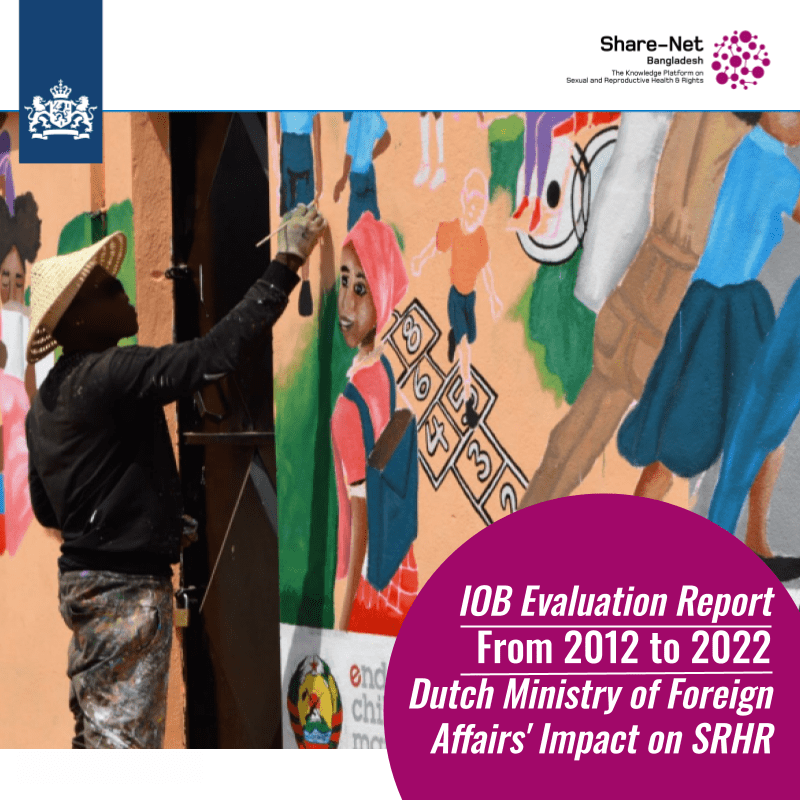From 2012 to 2022: Dutch Ministry of Foreign Affairs’ Impact on SRHR
Research Brief: Consistent Efforts, Persisting Challenges
Dutch Ministry of Foreign Affairs’ Contributions to Sexual and Reproductive Health and Rights (2012–2022)
In the last decade, the Netherlands has demonstrated a steadfast commitment to advancing Sexual and Reproductive Health and Rights (SRHR) in low- and lower-middle-income countries. The Policy and Operations Evaluation Department (IOB) of the Ministry of Foreign Affairs conducted a comprehensive assessment spanning the years 2012–2022, delving into both development cooperation and diplomatic efforts.
With a substantial allocation of nearly EUR 5 billion, constituting 10% of the Dutch development-cooperation budget, the Netherlands has been a frontrunner in promoting universal SRHR. This commitment aligns with the Sustainable Development Goals, yet persistent challenges, including issues surrounding women’s autonomy and the denial of rights for certain groups, persist despite global progress.
The evaluation, drawing insights from primary data in Uganda and Bangladesh, highlights the positive impact of Dutch support on SRHR, contributing to improved outcomes through increased access to reproductive and health commodities. However, not all interventions yielded expected results, with ‘blind spots’ where evidence on effectiveness was inconclusive.
The IOB identified consistency in Dutch SRHR policy, responding to emerging needs in target countries. Yet, key policy assumptions lacked clarity, and evidence-based policy choices were not consistently applied. While efforts showed varied effects, the evaluation underscores challenges hindering a comprehensive assessment of the Dutch policy’s overall impact.
Despite annual reporting to the Dutch parliament and the public, Monitoring and Evaluation (M&E) systems faced limitations affecting the validity and reliability of reported results. Economic efficiency of supported projects remains unknown, and organizational efficiency presents a mixed picture.
IOB’s six recommendations offer practical steps for improvement. Key suggestions include a clearer formulation of Dutch SRHR policy, a rebalancing of program management and diplomatic activities, and a realistic outlook on the limited sustainability of projects beyond Dutch funding.
To enhance impact, the IOB suggests attaching more weight to program management and reconsidering the current strategic-partnership model to reduce management costs and fragmentation. Realistic outlooks on project continuation and cautious monitoring at outcome and impact levels are emphasized.
The Dutch contribution to SRHR has made commendable strides, but challenges persist. The IOB’s recommendations provide a roadmap for refining strategies, improving efficiency, and ensuring sustained positive outcomes. As the Netherlands navigates the future of SRHR endeavors, a clear policy framework, strategic program management, and heightened awareness of project sustainability will be crucial elements.
The evaluation underscores the importance of adaptability and evidence-based decision-making to address persisting challenges and further solidify the Netherlands’ role as a proponent of global Sexual and Reproductive Health and Rights. So, consistent efforts, paired with a nuanced understanding of challenges and a commitment to improvement, will pave the way for a more impactful Dutch contribution to SRHR in the years ahead.
Download Consistent Efforts, Persisting Challenges
Source: IOB Evaluatie Netherlands
